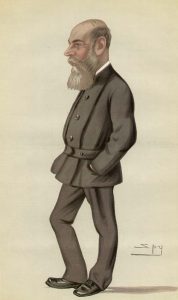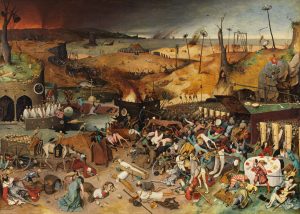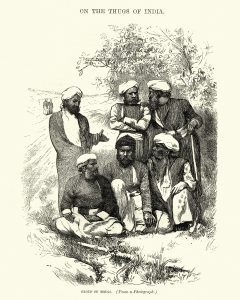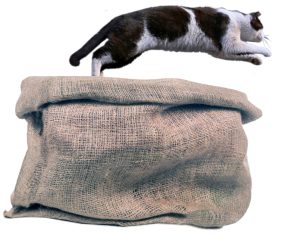18 English Words And Phrases That Have Interesting Origins
‘I can talk English, I can walk English, I can laugh English because English is a very funny language’, this iconic dialogue of Amitabh Bachchan from the movie Namak Halal beautifully captures the essence of the English language. The language is spoken by almost 1 Billion people around the world, and there are new words added nearly every 2 hours. Thus there is no surprise that there are many words and phrases in the English language that have very interesting and amazing backstories. In this article, we got you some words and phrases that have the most interesting backstories.
Also read: 16 English Words That Come From People’s Names
1.) Boycott
The word ‘boycott’ comes from Charles Cunningham Boycott who was an English property agent in Ireland
Boycott served as a land agent for landowner Lord Erne following his military service and started evicting people from his estate. Local Irish National Land League members in 1880 persuaded Boycott’s employees to strike in opposition which launched a campaign of social isolation against Boycott. This movement became so popular that the word ‘boycott’ became a common word.
Image Source: Wikimedia Commons
2.) Cobra-Effect
The Cobra Effect refers to the unintended negative consequences of an incentive that was designed to improve society or individual well-being.
The word comes from an incident in history; there was a cobra infestation in Delhi during colonial times. To solve this problem, the British decided to create a bounty for cobra skins. They thought by rewarding the public for killing snakes, the public would solve the problem. But people started capturing cobras and started farming them to get more bounty. The British when they found out about this cancelled the bounty. Thus, the cobra farmers, now with no incentive of bounties, set cobras free – making the infestation even worse than before. It’s from this that the Cobra Effect gets its name.
Source: Wikipedia Commons, Representative
3.) Sandwich
The sandwich comes from the name of an English aristocrat from the eighteenth century named John Montagu, 4th Earl of Sandwich. It is rumored that Lord Sandwich would ask his valet to bring him salt meat between two pieces of toasted bread during lengthy bouts of card games.
After that, the meal gained popularity in London, and Sandwich’s name started to be linked to it.
Image Source: Wikimedia Commons
4.) Quarantine
A word we are all very familiar with, Quarantine comes from ‘quarantena’ or ‘quarantaine’ from the Venetian language in the 14th and 15th centuries, meaning “forty days”. This was the time period during which all ships had to be isolated before passengers and crew could step ashore and deboard during the height of the Black Death plague. Also, ships arriving from infected ports had to anchor for 40 days due to the plague before they could land.
Source: Wikipedia
5.) Thug
This pretty common English word actually traces its root to the Hindi language, it comes from the Hindi word ठग (thag) which means ‘swindler’ or ‘deceiver’. Thugs were reported to roam in groups across the Indian subcontinent, acting as highway robber gangs, deceiving and later strangling their victims. To take advantage of their victims, the thugs would join them and acquire their trust, allowing them to surprise and strangle them with a handkerchief or rope. Then they would rob and bury their victims.
Source: Wikipedia
6.) Breaking The Ice
Prior to the development of road transportation, ships were the only mode of transportation and means of trade. During the winter, the ships would become stranded due to ice buildup. Thus, small ships would be sent by the receiving country to “break the ice” and clear a path for the trade ships. This gesture demonstrated the two territories’ affinity and understanding. Soon the phrase stopped being used in the literal sense and began to be used in the way we are now familiar with.
Source: Picryl, Representative
7.) Butter Someone Up
This phrase, “To butter someone up” which means to praise or flatter someone to gain something from them comes from an ancient Indian custom that involved throwing balls of “ghee” at statues of the gods to seek favor.
Source: Rawpixel, Representative
8.) Turn A Blind Eye
This phrase is said to have originated during the siege of Copenhagen (1801), when Lord Horatio Nelson, second in command of the English fleet, was ordered to retreat but he claimed to not see the flagship’s signals and he did so by placing his glass to an earlier battle-blinded eye.
Source: Pexels, Representative
9.) Cat Out Of The Bag
The phrase, “letting the cat out of the bag” is said to come from the whip-like “cat o’nine tails,” a punishment weapon employed on Royal Navy ships. The instrument was said to be kept in a sack, and any sailor who revealed another’s sins would be “letting the cat out of the bag.”
There is an alternate theory on the phrase’s origin which comes from the middle ages. In the middle ages, sellers would swindle their customers by placing a cat instead of a pig and when that buyer would reach home, they would ‘let the cat out of the bag’ and realize they were swindled.
Source: Wikipedia Commons
10.) Stole His Thunder
This phrase which is used in today’s lingo to mean preventing someone from having success or attention has very interesting origins. The phrase comes from dramatist John Dennis (1658-1734), who created a thunder machine for his play Appius and Virginia. However, the play turned out to be a flop. Later Shakespeare’s Macbeth was put on and the play used the same thunder techniques used by Dennis whiteout his permission. Dennis was not pleased with this idea and he was recorded as saying-
“Damn them! They will not let my play run, but they steal my thunder.”
Source: Pixabay
11.) Bottoms up!
Though the phrase’s origin is really not that clear but legend has it that English sailors used to be bribed with coins into the navy and they would be tricked into it by being given a beer with a coin at the bottom of the glass. that’s when men started saying “bottoms up” to their friends so that they could see if there are coins hidden inside the glasses.
Source: Wallpaper Flare
12.) Sacked
The phrase, ” To get sacked” which means to get fired from a job has its origins in 17th-century France. In those days workmen carried their belongings and tools in a bag or a sack. Thus when they were dismissed from their job, the worker had to pick up his sack and leave, thus he was ‘sacked’.
Source: Pixabay
13.) Deadline
The term “deadline” first appeared in print in 1864 and has its roots in the American Civil War. Prisons were surrounded by a “do not cross” line when there was war. Any prisoner who touched, fell over, passed over, under, or crossed the alleged ‘death line’ was to be shot and killed, the guards were instructed.
Later on, by the 1920s it began to be used in journalism jargon where it is used to mean a time-limit
Source: Pixabay
14.) Bangalored
The word Bangalored is used to define someone who loses their job their work has been moved to another country where labor is cheaper. This is a new word that has caught on in the now globalized world. It is not difficult to guess where the origin of this word comes from, the city of Bangalore. Bangalore has seen a lot of IT Companies come up since the 90s and the early 2000s and people in the US and other Western countries began losing jobs to these companies and hence the word Bangalored caught on.
An example of the use of this word is: “The United States is being Bangalored, with Americans allegedly losing jobs to more hardworking Indians.”
Source: Wikipedia Commons
15.) Juggernaut
The English word juggernaut which means something very huge and massive comes from the Sanskrit word Jagannath which translates to ‘war-lord’ which is one of the names for Lord Krishna. The word is used to mean something massive because of the ritual of rath-yatra at Jagannath temple where huge chariots are pulled by devotees. In the 14th century, Franciscan missionary Friar Odoric shared the story of Jagganath and also shared how worshippers deliberately allowed themselves to be crushed beneath the vehicle’s wheels as a sacrifice in Europe. This tale caught the imagination of the people, and they began using the word juggernaut to refer to any massive vehicle.
Source: Wikipedia Commons
16.) Bite the bullet
“Biting the bullet” is a phrase that is used to depict a situation in which one accepts an approaching impending hardship and then endures the following suffering with fortitude. Rudyard Kipling coined the phrase in his 1891 novel The Light that Fails.
It has been theorized that it derives from the practice of having a patient clench a bullet between their teeth to cope with the discomfort of a surgical procedure without an anesthetic.
Source: Wikimedia Commons, Representative
17.) Show One’s True Colors
The phrase, ‘To show one’s true colors” means to reveal one’s true nature or one’s true motives. The expression comes from maritime jargon. A ship’s colors are its flags. To gain an advantage in a naval fight, a ship may lower its colors or even fly the enemy’s colors. To display one’s real colors, then, meant to lower a counterfeit flag and fly the flag of the sovereign whose allegiance the ship truly pledged.
Source: Wallpaper Flare, Representative
18.) Pass With Flying Colors
The phrase, “pass with flying colors” means to succeed in something difficult. And the origins of this phrase also lies in maritime lingo. In the 1600s, warships would fly the colored flags of their country after a victory. Thus, if you saw a ship pass with colored flags flying, you could assume they just won a battle at sea.
Source: Wikipedia Commons, Representative
There are still a lot many words and phrases that have very interesting origin stories that we haven’t covered, tell us in the comments if we should do a part-2. With that, we come to the end of this article, hope you had fun reading it and comment down which one surprised you the most, till then adios!



















